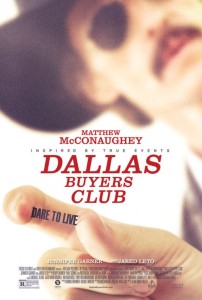 A recent post by Jeffrey Tucker identifies a common theme in many of today’s movies: “powerful people are not our friends but our enemies – so if we want to have a free and flourishing life, we are going to have to get busy and figure out how to make it happen.”
A recent post by Jeffrey Tucker identifies a common theme in many of today’s movies: “powerful people are not our friends but our enemies – so if we want to have a free and flourishing life, we are going to have to get busy and figure out how to make it happen.”
One movie in theaters now that reflects this message as much as any is Dallas Buyers Club, which is based on the true story of Ron Woodruff, an electrician and rodeo enthusiast diagnosed with AIDS and given 30 days to live in 1985.
Soon after his diagnosis, Woodruff (Matthew McConaughey) learns that there’s a drug for treating AIDS, AZT, but it’s still in FDA trials. He can participate in a trial, but he won’t know whether he’s getting the real drug or a placebo. Understandably, he doesn’t find this satisfactory.
Woodruff’s efforts to get a reliable source of AZT lead him to a clinic in Mexico, where he’s told that AZT is actually harmful — in fact, it did seem to be making his condition worse — and that there are other AIDS drugs that aren’t available in the U.S., thanks once again to the FDA. The clinic gives him DDC and the protein Peptide T instead. Soon he’s getting them not only for himself but also for many other AIDS patients, distributing them through a “buyers club” he starts with a transgender woman (Jared Leto). When the supplies in Mexico run short, he starts traveling to other countries, such as Japan and Israel, to get more, convincing customs officials that it’s all for his personal use.
Eventually FDA agents raid the club and take all the DDC. Woodruff sues to at least be allowed to distribute the non-toxic Peptide T but loses.
Through all of this, the FDA is portrayed as a nothing but a villain for stopping terminally ill people from getting treatments they believe will help them. Woodruff, on the other hand, is portrayed as a hero for defying the feds — even as he makes lots of money doing so. What a change from movies of past decades, where the businessman was always the villain and government agents always saved the day!
A title card at the end informs that AZT later proved to be an effective treatment in lower doses, but I doubt anyone will walk away thinking this vindicates the FDA. The movie’s message is that people should be free to make their own health decisions.
Artistically, the film is watchable if not especially ambitious. The story is told straightforwardly and is compelling without indulging in melodrama. McConaughey gives a great performance as a once-bigoted cowboy who improves as he befriends and serves his fellow patients, and Leto is quite good, too. Although the movie takes place in the 1980s, the filmmakers don’t give consistent attention to period details — look closely and you’ll see present-day stuff sitting around. And it is somewhat annoying to learn from the internet that many things in the film — though not the stuff about the drug smuggling and the FDA — are fictional, including Woodruff’s bull riding, Leto’s character, and Jennifer Garner’s sympathetic doctor character.
Still, Dallas Buyers Club is much better than most movies and about as libertarian as they come, so I highly recommend it.

Comments on this entry are closed.
This review is not especially ambitious. 2 stars.
I was not aware that the Leto character was fictional. He was okay in the role, but I think his character (was he supposed to be a transsexual, or just a drag queen?) was confusing and stereotypical. But Hollywood loves to put a straight man in a dress. How about having a totally masculine gay man in this sort of film for a change of pace? But still, it was a good anti-FDA movie. And Matthew McConaughey was very good.